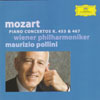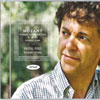Mozart Piano Concertos Nos 17 & 21
Pollini may need a little more direction while Rogé is beset by poor production
View record and artist detailsRecord and Artist Details
Composer or Director: Wolfgang Amadeus Mozart
Genre:
Orchestral
Label: Deutsche Grammophon
Magazine Review Date: 1/2007
Media Format: CD or Download
Media Runtime: 57
Mastering:
Stereo
DDD
Catalogue Number: 477 5795GH

Tracks:
| Composition | Artist Credit |
|---|---|
| Concerto for Piano and Orchestra No. 17 |
Wolfgang Amadeus Mozart, Composer
Maurizio Pollini, Piano Vienna Philharmonic Orchestra Wolfgang Amadeus Mozart, Composer |
| Concerto for Piano and Orchestra No. 21, 'Elvira Madigan' |
Wolfgang Amadeus Mozart, Composer
Maurizio Pollini, Piano Vienna Philharmonic Orchestra Wolfgang Amadeus Mozart, Composer |
Composer or Director: Wolfgang Amadeus Mozart
Genre:
Orchestral
Label: Onyx
Magazine Review Date: 1/2007
Media Format: CD or Download
Media Runtime: 75
Mastering:
Stereo
DDD
Catalogue Number: ONYX4013

Tracks:
| Composition | Artist Credit |
|---|---|
| Concerto for Piano and Orchestra No. 9 |
Wolfgang Amadeus Mozart, Composer
Indianapolis Symphony Orchestra Pascal Rogé, Piano Raymond Leppard, Conductor Wolfgang Amadeus Mozart, Composer |
| Concerto for Piano and Orchestra No. 25 |
Wolfgang Amadeus Mozart, Composer
Indianapolis Symphony Orchestra Pascal Rogé, Piano Raymond Leppard, Conductor Wolfgang Amadeus Mozart, Composer |
Author: Nalen Anthoni
A shortcoming is that Pollini does not respond fully to the buoyancy in the orchestral writing. There is little tension and relaxation within many phrases so they tend to “sit” rather than come to life. Nor does Pollini the soloist always acknowledge the subsidiary side to his role, and the wind instruments - of equal importance - get submerged because he is too loud. The recording is unhelpful. His prominent presence (more so in the cadenzas) probably makes it difficult for a corporate approach to hold sway.
Nevertheless, Pollini is aware of Mozartian style. The slow movements are most affectingly played; and if he is a mite staid in the first movement of K467 (the direction Allegro maestoso, which suggests a measure of stateliness, might not be by Mozart; one copy of the score contains no marking at all), the tempo itself is an example of his commendable refusal to hustle the music. Pollini simply needs more experience of conducting, an art that Raymond Leppard has been practising for more than 50 years.
His pianist, Pascal Rogé, is also forwardly placed and pushed further upfront for the cadenzas. That of the first movement of K503, presumably the soloist's own, is so out of perspective that the orchestra's grand re-entry is enfeebled. These bad lapses in production standards put Rogé, in particular, at a disadvantage. Throughout these performances he proves to be a supreme technician and deeply sensitive musician. Moreover, he is given wholehearted support by Leppard who is in complete control of orchestral texture and instrumental balance, reticent, spongy timpani notwithstanding. But the lopsided presentation disturbs concentration and takes the edge off absorbing interpretations that complement the ones by Alfred Brendel and Charles Mackerras. Readers who are not bothered by the flaws in this new recording might care to have both discs.
Discover the world's largest classical music catalogue with Presto Music.

Gramophone Digital Club
- Digital Edition
- Digital Archive
- Reviews Database
- Full website access
From £8.75 / month
Subscribe
Gramophone Full Club
- Print Edition
- Digital Edition
- Digital Archive
- Reviews Database
- Full website access
From £11.00 / month
Subscribe
If you are a library, university or other organisation that would be interested in an institutional subscription to Gramophone please click here for further information.




